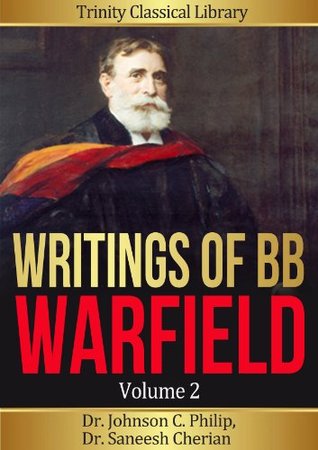- Bible
- Read the Bible
- Bible Versions
- Verse of the Day
- Reading Plans
- Verses by Topic
- Books of the Bible
- Bible Images
- Study
- Commentaries
- Concordances
- Dictionaries
- Encyclopedias
- Sermons
- Bible Atlas & Maps
- BP Wiki
- Devotionals
- Today's Devotionals
- Light of the World
- All Devotionals
- Inspirational Quotes
- More
- Picture Quotes
- Videos
- Inspirational
- Bible Study
- What The Bible Says
- Bible Q&As
- Daily Bread
- Bible by Genre
- Bible Stories
- Random Bible Verse
- Community
- Store
Collected Works of BB Warfield, Volume 2 (Annotated) (Trinity Classical Library, BB Warfield)
by Benjamin B. Warfield
Collected Works of BB Warfield, Volume 2 (Annotated): Inspiration And Canon
Bibliology and doctrines related to the inspiration and infallibility of the Bible are one of the foundations on which the conservative Christian faith stands. BB Warfield was one of the strongest defenders of these doctrines in the past generations. Thus any current study of bibliology needs to take Warfield and his writings into account. Thus we are happy to make this major article available in this form.
The three major and substantial papers include:
*** Inspiration
*** The Formation of the Canon of the New Testament
*** The Authority and Inspiration of the Scriptures
Bibliology and doctrines related to the inspiration and infallibility of the Bible are one of the foundations on which the conservative Christian faith stands. BB Warfield was one of the strongest defenders of these doctrines in the past generations. Thus any current study of bibliology needs to take Warfield and his writings into account. Thus we are happy to make this major article available in this form.
The three major and substantial papers include:
*** Inspiration
*** The Formation of the Canon of the New Testament
*** The Authority and Inspiration of the Scriptures
BUY NOW
Kindle Edition, 51 pages
Published December 20th 2013 by Philip Communication
© 2025 Bibleportal.com All rights reserved.

Benjamin Breckinridge Warfield was professor of theology at Princeton Seminary from 1887 to 1921. Some conservative Presbyterians consider him to be the last of the great Princeton theologians before the split in 1929 that formed Westminster Seminary and the Orthodox Presbyterian Church.
Warfield entered Princeton University in 1868 and graduated in 1871 with high honors. Although Warfield studied mathematics and science in college, while traveling in Europe he decided to study theology, surprising even many of his closest friends. He entered Princeton Seminary in 1873, in order to train for ministry as a Presbyterian minister. He graduated in 1876. For a short time in 1876 he preached in Presbyterian churches in Concord, Kentucky and Dayton, Ohio as a "supply pastor". In late 1876 Warfield and his new wife moved to Germany where he studied under Ernst Luthardt and Franz Delitzsch. Warfield was the assistant pastor of First Presbyterian Church in Baltimore, Maryland for a short time. Then he became an instructor at Western Theological Seminary, which is now called Pittsburgh Theological Seminary. He was ordained on April 26, 1879.
During his tenure, his primary thrust (and that of the seminary) was an authoritative view of the Bible. This view was held in contrast to the emotionalism of the revival movements, the rationalism of higher criticism, and the heterodox teachings of various New religious movements that were emerging. The seminary held fast to the Reformed confessional tradition — that is, it faithfully followed the Westminster Confession of Faith.
Warfield's view of evolution may appear unusual for a conservative of his day. He was willing to accept that Darwin's theory might be true, but believed that God guided the process of evolution, and was as such an evolutionary creationist.
... Show more